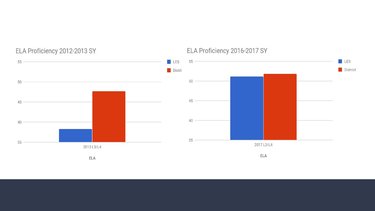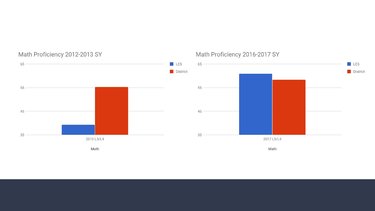Super says: Lynnwood raised scores are ‘simply stunning’
— From a PDF created by Lynnwood staff
Lynnwood students’ results on state standardized testing rose significantly over the years from 2012-13 through 2016-17. The percentage of students in Lynnwood who achieved Levels 3 or 4 (proficient or above proficient) is shown at left, and the same percentage for students districtwide, including the middle school, is shown at the right. The numbers rose to almost the same level in English Language Arts, while, in math, Lynnwood students came to surpass the district results.
GUILDERLAND — Six years after being listed as a school in need of improvement, Lynnwood Elementary has not only equaled the test results of the rest of the district but, in some cases, surpassed them.
Lynwood draws students with special needs from across the district.
The school board heard a presentation Tuesday by Lynnwood’s principal, Alicia Rizzo, and several faculty members about Lynnwood’s success raising its test scores after it was deemed, in November 2011, a “school in need of improvement” under the federal No Child Left Behind Act, a designation referred to as SINI status. It was one of 1,325 elementary, middle, and high schools given this designation that year across the state.
At the school board meeting, Rizzo and Lynnwood faculty discussed a program that they have implemented over the last seven years called Literacy Collaborative, in which coaches are trained in classroom methods that can reach all students including those who are struggling, and those coaches then work interactively to train classroom teachers.
The methods that are used in Literacy Collaborative for teacher coaching involve a great deal of classroom observation, feedback, and reflection, the board heard.
The program focuses on giving teachers tools to help set students up for success and for being able to answer questions themselves, the board heard. It is based in the same principles and methods used in the Reading Recovery program, but generalized for the classroom.
The Reading Recovery program helps first-grade students who are the lowest-achieving in reading, working intensively with them to set them on a path for higher achievement.
The Literacy Collaborative program was developed after a period of reflection and research into best methods, Superintendent Marie Wiles said Wednesday. At one point early on, she said, the school’s entire staff took a vote as to whether they wanted to implement the program.
Wiles said on Wednesday that the results achieved at Lynnwood have been “simply stunning.”
At Lynnwood, the board heard at the meeting, only about 37 percent of the school’s students achieved a Level 3 or 4 result on English standardized testing in the school year 2012-13; Level 3 is considered proficient, while Level 4 is “above proficient.” In that same year, about 47 percent of students districtwide — in the four other elementary schools and the middle school — achieved Levels 3 or 4. By 2016-17, that difference was negligible, with Lynnwood’s standing at about 51 percent and the district’s at about 52 percent.
In standardized math testing, Lynnwood came to surpass the district. Initially, in 2012-13, Lynnwood stood at about 37 percent, and the district at 55 percent. But in 2016-17, Lynnwood's results were better, with about 61 percent of students achieving Levels 3 and 4, as compared to about 58 percent for the district.
The statewide level in 2016-17 for ELA was 39.8 percent and, for math, 40.2 percent. So both Lynnwood and the district are well above the average for New York State.
Coaches participated in 18 months of graduate coursework at Lesley University in Boston — six weeks of face-to-face work at the university, as well as online work and bimonthly webinars and also received on-site visits from university liaisons.
Many different faculty members said that the methods involve the teacher talking less and drawing out students more. The methods are used in both English and math classes.
Teachers who are new to Lynnwood receive the most help from coaches — 40 hours of professional development in their first year, said literacy coach Nell Ball, who works with students in grades 3 through 5, but veteran teachers also said that the methods they learned had invigorated their teaching.
Also presenting at the board meeting was Kathleen Barker, a literacy coach for students in kindergarten through second grade.
Joan Craig has taught for 18 years, in second and third grades, at Westmere and Lynnwood. She said at the meeting, “With less guidance from me, the student could do more talking, and demonstrate his understanding of the text.”
Fourth-grade teacher Jo Ann Romano said, in a video shown at the meeting, “I’ve shifted from teaching the content to teaching the reader, the writer, the mathematician, and the scientist.”
Several board members asked if the program could be expanded to the district’s other elementary schools. Wiles said that the district has begun to talk with other elementary schools about the possibilities, but noted, ”This is really about a willingness to be vulnerable” and to admit not knowing everything about best teaching practices.
She also noted that the program has been “seven years in the making,” and that “year one and two were not pretty.”
Westmere Elementary School Principal Beth Bini took a team to Lesley University last spring in a first exploratory visit, to see whether the program is something Westmere might be interested in pursuing, Wiles said.




